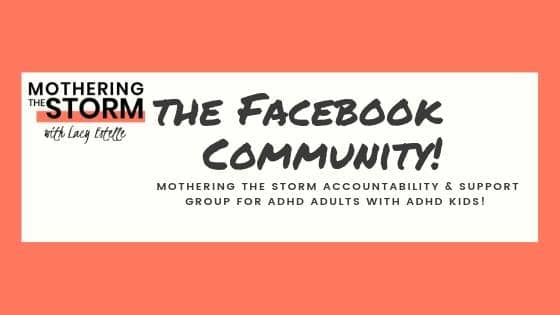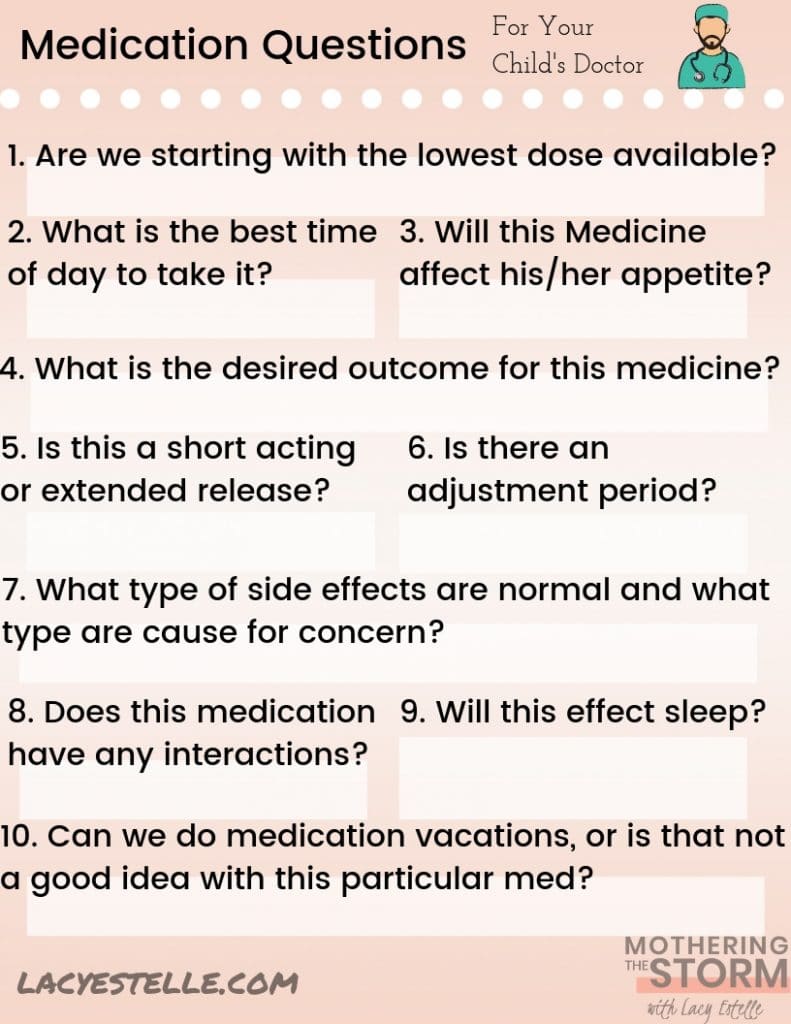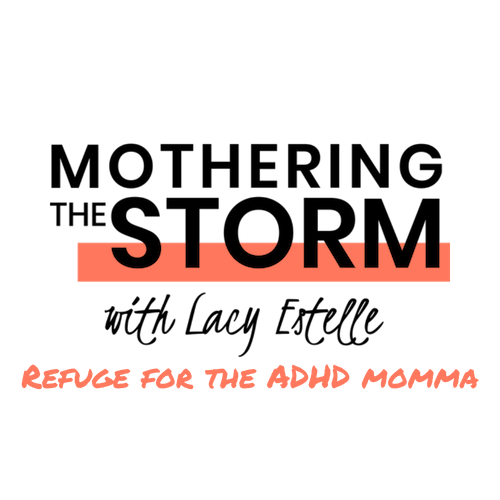This post may contain affiliate links. This means, if you make a purchase from a link on this page, I may receive a small commission at no extra cost to you. You can find our entire disclaimer here.
Tell someone else!
Drawing a blank on what to ask your doctor about your ADHD diagnosis ?
Not to fear, I’ve written out nine questions you may or may not want to ask your psychologist, psychiatrist or neurologist, before you leave your appointment. Whether you’ve known for a while, you have ADHD or have received a formal ADHD diagnosis recently there are still questions to be answered.
When I first dove into my self-discovery of ADHD, I didn’t realize just how many things in my life it was affecting. My moodiness and temperament being a symptom didn’t occur to me until my doctor explained.

Click Here to Join the Mothering the Storm Facebook Group! An Encouragement Group For Parents who have ADHD and are also caring for an ADHD Child!
So before you leave your doctors office here are nine questions to ask. My hope is the answers you receive leave you feeling more in control of your mind and body.
1. What treatment options are available?
I know this seems like a no-brainer, but just because you have a diagnosis doesn’t always mean your treatment should be the same as everyone else. Perhaps medication is not something that would suit you. If you are a recovering alcoholic introducing you to a controlled substance might not be your best option. Behavioral therapy, as well as more controversial options like biofeedback, are other avenues to explore.
2. Which type of ADHD do I have?
According to DSM-5, there are three types of ADHD. Impulsive/Hyperactive type, Inattentive type, and Combination type. I have inattentive type coupled with anxiety and PTSD. You may have a combination or hyperactive. Don’t mistake the fact that you aren’t a child and bouncing off the walls as not having hyperactive. Hyperactivity from ADHD in adults looks more like restlessness, insomnia, inability to sit still, etc. And ironically, of the hyperactive ADHD adults I’ve met, they feel fatigued because of their lack of rest.
3. Do I have a co-occurring disorder?
Often times ADHD does not like to be alone and usually has a buddy. The most common co-occurring disorders are Anxiety, Depression and Oppositional Defiance Disorders. But it can also co-occur with many others, including PTSD. It’s important to get a complete diagnosis because your treatment options should be addressing every facet of your mental health.
4. How is this affecting my life and choices?
It’s not a guarantee that your doctor can answer this, but they may be able to give you examples. My doctor was able to show me how the mismanagement of my ADHD diagnosis likely contributed significantly to my inability to complete college. Information like that empowers you to change your choices in the future. Giving you a better understanding of your brain and its strengths.
5. Which disorder is this prescription targeting first?
If your doctor feels it is in your best interest to prescribe medication it’s important to know which disorder he/she feels is impacting the majority of your symptoms. Often times ADHD is treated with a stimulant. But if you also have anxiety, it’s not uncommon for stimulants to make anxiety worse. In those instances you may want to ask your doctor to treat your anxiety first, then later add another medication if he or she still feels it is in your best interest.

6. Are there any natural supplements I can take to help with my symptom management?
I have an entire post listing out every natural supplement we used when my son was still in the pre-medication phase of managing his ADHD. As an adult, I’ve found they work well when coupled with a regular workout regimen. Your doctor may not know supplement knowledge super well, in that case, you could read the book Healing ADD by Neuropsychiatrist Dr. Daniel Amen where he lists out a myriad of supplements depending on your symptoms.
7. If I am prescribed medication, will it affect any other parts of my body?
Some medications for ADHD can have side effects that pertain to blood pressure or heart rate. It’s definitely important to know these ahead of time.
>Check It Out: I’ve made a Free Printable of 10 Medication Questions to ask you or your child’s doctor. It’s in the Resource Library!

8. How long will it take treatment to have an effect?
If you are prescribed medication, you’ll want to know if you can expect symptom management to become easier right away. Or if your prescription will need to build up in your system. If you are seeking other types of treatment, you should be creating a treatment plan and goals. These goals might take six months to a year. Change takes time. Be patient with yourself. It’s likely you’ve created habits over the years to manage, or mismanage your symptoms and patterns are not quickly changed.
9. Is it hereditary?
Ask if there are symptoms you can watch for in your children. I didn’t realize I had ADHD until after my son’s diagnosis. But if that isn’t the case for you ask for what to look for in your child. Teenagers with ADHD are more prone to depression as well as self-harming behaviors like using drugs and alcohol.
I hope when your doctor answers these questions you feel more empowered to take on the world. Coming from someone who felt invalidated for most of her life, my ADHD diagnosis empowered me. I felt I finally understood a missing link in my life, and now I knew what to do about it.
Don’t forget to Pin this for quick reference next time you see your doctor!









